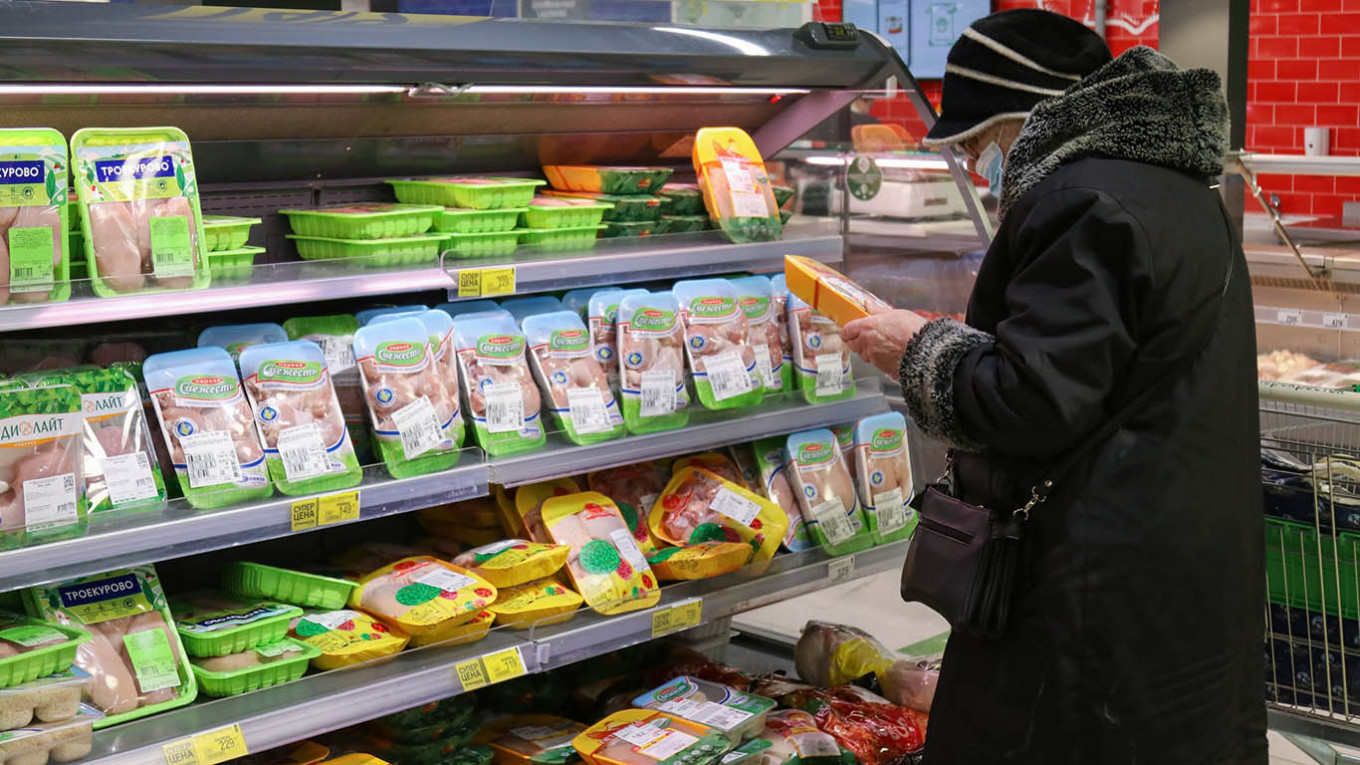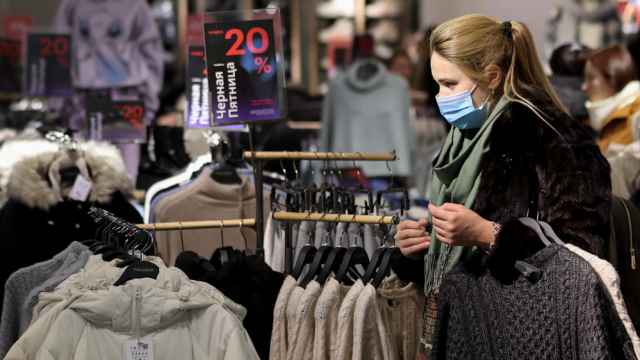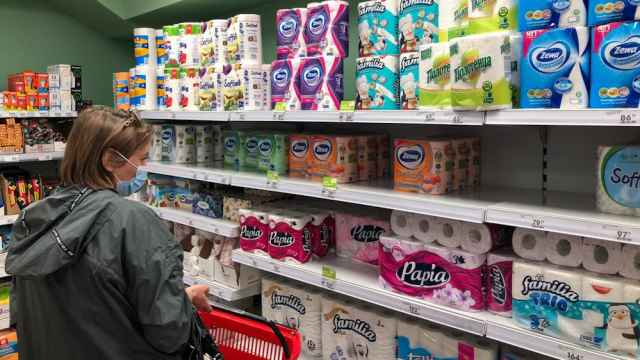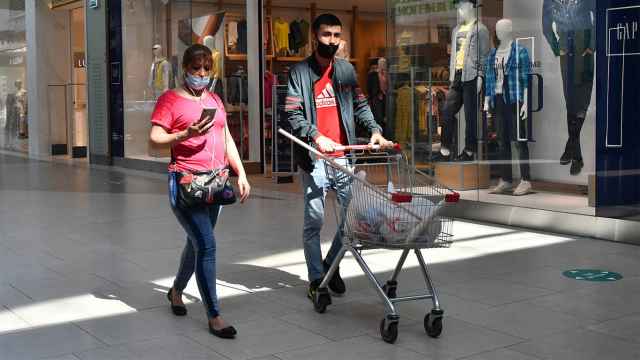Lyubov, a 59-year-old pensioner doing her weekly shop, doesn’t know why her Russian state pension isn’t going as far as it used to, but is sure the government needs to do something about it.
“All the prices for food are going up,” she told The Moscow Times on her way out of a branch of Billa, a mid-range supermarket in the capital’s Profsoyuznaya district. “Everyday products like sugar, bread, eggs and chicken have become too expensive.”
Higher prices have forced Lyubov to think twice about what goes into her basket and shop more frequently in discount supermarket chain Dixy.
“The government’s role is to ensure people don’t go hungry. But hunger is already here. I see lots of nonprofit organizations and churches helping to feed people … That should be the state’s responsibility,” she said.
Food prices have long been a hot-button issue in Russian society. Now, rising prices for staple goods — the result of climbing global prices, a weaker ruble and other specific factors, like a bird flu outbreak that caused a dearth of chicken and eggs — are hitting hard on the back of the economic crisis and years of falling living standards.
Official data shows food prices rose 7.7% over the last year — the fastest rate in five years — while Russians’ disposable incomes climbed by less than 1.5% in cash terms. After adjusting for inflation, Russians’ disposable incomes have fallen by more than a tenth since 2013.
In a country where rationing, shortages and hyperinflation are all within living memory, rising prices are rattling the Kremlin.
In December, the government rolled out price caps for staples like sugar and sunflower oil. That was followed by tax hikes on grain and other agricultural exports to discourage sales abroad, as well as a steady stream of statements from President Vladimir Putin, Prime Minister Mikhail Mishustin and others about the need for supermarkets and producers to do their utmost to keep prices low.
That the topic is a sensitive one for the Kremlin was showcased by its tetchy response to a Bloomberg article highlighting Russia as one of five countries where inflation could trigger a new bout of social discontent.
Earlier this week, a lawmaker from the ruling United Russia party even introduced draft legislation that would make it illegal to publish false information about food price inflation that could “trigger panic buying.”
But still prices continue to rise. Sugar is up two-thirds since March 2020, and other staples like eggs, sunflower oil, meat, fruit and vegetables have also seen double digit increases.
“I first noticed it in November, when the cost of apples and tomatoes surged,” said Viktoria, a 25-year-old sales manager shopping in a Moscow Dixy. “Now I buy groceries on sale. If it’s something I can live without, I’ll wait for a discount. But I can’t not buy staples like milk, eggs, bread and meat.”
‘Naive response’
The government’s price caps have been criticized by some economists as an ineffective, populist response to address the concerns of the millions of people noticing a spike in the cost of their usual shopping.
“Price caps are a measure of desperation,” Ruben Enikolopov, rector of the New Economic School told The Moscow Times. “They are very bad for the economy in the long term, as it hurts the incentives for business owners to invest in agriculture … it doesn’t really solve the problem.”
Andrei Kolesnikov, a senior fellow at the Carnegie Moscow Center, said caps fight the consequence rather than the cause. He added that the real economic problems are deeper: “the excessive presence of the state in the economy, weak competition and a weak ruble due to foreign policy arrogance.”
Economic figures inside the state apparatus, including Central Bank chief Elvira Nabiullina and Audit Chamber head Alexei Kudrin, are also against price caps.
While Russia cannot escape the impact of rising global prices, there are other short-term policies the government could have taken to keep them in check at home, said economist Vladislav Inozemtsev, director of the Center for Post-Industrial Studies in Moscow. Russia could cut sales tax on agricultural products, for instance, or the government could step in as a middleman — purchasing raw supplies at market rates and selling them to processors and manufacturers at a discount.
“But all the blah-blah-blah about monitoring price increases and freezing prices by consent between the government, the producers and retail chains looks absolutely naive and ineffective,” he said.
Food manufacturers are also unhappy about the measures, feeling squeezed between domestic politics and global economic realities.
“These restrictive measures have driven suppliers into a vice. They are between the hammer of raw material producers and the anvil of state regulation,” Dmitry Vostrikov, director of the Russian Food Producers and Suppliers Association told The Moscow Times.
“Many businesses are literally balancing on the brink of profitability. Yes, we temporarily halted price rises on the shelves, but nobody knows what will happen next, once all these agreements expire. History shows that attempts to regulate prices achieve no tangible results except a reduction in supply and local shortages.”
‘No money’
There is also a broad understanding that the reason rising food prices are being felt so acutely across the country, and have triggered such active government intervention, is due to Russia’s wider economic predicament.
“The basic problem is that people are poor,” said Vladimir Milov, an economist and former government minister in the early Putin era who is now a leading opposition figure.
“The country hasn’t seen economic growth for a long time. We’re in a persistent crisis, and have had seven years of declining or stagnating real incomes.”
Even by recent standards, the current level of inflation in Russia is low. But this has been matched by weak growth, and the most severe living standards squeeze in a generation.
“The growth in food prices is slower than it was 20 years ago,” added Milov. “But this issue was not on the agenda back then because incomes were growing and people were able to pay the higher prices. Now, they have no money — that’s why it is a much more sensitive issue.”
Milov believes food prices are just one part of the larger socio-economic discontent that has pushed approval ratings for United Russia to record lows and increased discontent with the Kremlin.
Shopper Viktoria also sees a direct connection between her higher shopping bills and Kremlin policy.
“I don’t think producers are to blame because they are losing money too,” she said. “It's more the overall economic situation — and especially the foreign policy being dictated by our Tsar,” she said, referring to Putin.
Studies have shown that Russia’s counter-sanctions against European food imports, in place since 2014, have led to higher prices.
‘Take care of us’
The current curbs — a mix of enforced price caps and semi-voluntary agreements to freeze prices — start to expire at the end of March. With nationwide parliamentary elections set for September, the government can’t afford to ignore the problem.
“There’s discontent among pensioners — and they are the most reliable voters,” said Enikolopov. “I don’t expect anything like food riots, but it’s realistic that the government could realistically face problems in the September elections.”
Expectations among Putin’s core constituency are high. “The overall economic situation is bad, and the producers and supermarkets are taking advantage of that,” said pensioner Lyubov.
“We need our government to take care of us.”
A Message from The Moscow Times:
Dear readers,
We are facing unprecedented challenges. Russia's Prosecutor General's Office has designated The Moscow Times as an "undesirable" organization, criminalizing our work and putting our staff at risk of prosecution. This follows our earlier unjust labeling as a "foreign agent."
These actions are direct attempts to silence independent journalism in Russia. The authorities claim our work "discredits the decisions of the Russian leadership." We see things differently: we strive to provide accurate, unbiased reporting on Russia.
We, the journalists of The Moscow Times, refuse to be silenced. But to continue our work, we need your help.
Your support, no matter how small, makes a world of difference. If you can, please support us monthly starting from just $2. It's quick to set up, and every contribution makes a significant impact.
By supporting The Moscow Times, you're defending open, independent journalism in the face of repression. Thank you for standing with us.
Remind me later.








